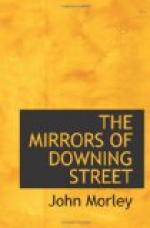This spirit of the intuitional reformer, who feels cruelty and wrong like a pain in his own blood, is still present in Mr. Lloyd George, but it is no longer the central passion of his life. It is, rather, an aside: as it were a memory that revives only in leisure hours. On several occasions he has spoken to me of the sorrows and sufferings of humanity with an unmistakable sympathy. I remember in particular one occasion on which he told me the story of his boyhood: it was a moving narrative, for never once did he refer to his own personal deprivations, never once express regret for his own loss of powerful encouragements in the important years of boyhood. The story was the story of his widowed mother and of her heroic struggle, keeping house for her shoemaking brother-in-law on the little money earned by the old bachelor’s village cobbling, to save sixpence a week—sixpence to be gratefully returned to him on Saturday night. “That is the life of the poor!” he exclaimed earnestly. Then he added with bitterness, “And when I try to give them five shillings a week in their old age I am called the ’Cad of the Cabinet’!”
Nothing in his life is finer than the struggle he waged with the Liberal Cabinet during his days as Chancellor of the Exchequer. The private opposition he encountered in Downing Street, the hatred and contempt of some of his Liberal colleagues, was exceeded on the other side of politics only in the violent mind of Sir Edward Carson. Even the gentle John Morley was troubled by his hot insistences. “I had better go,” he said to Mr. Lloyd George; “I am getting old: I have nothing now for you but criticism.” To which the other replied, “Lord Morley, I would sooner have your criticism than the praise of any man living”—a perfectly sincere remark, sincere, I mean, with the emotionalism of the moment. His schemes were disordered and crude; nevertheless the spirit that informed them was like a new birth in the politics of the whole world. A friend of mine told me that he had seen pictures of Mr. Lloyd George on the walls of peasants’ houses in the remotest villages of Russia.
But those days have departed and taken with them the fire of Mr. Lloyd George’s passion. The laboured peroration about the hills of his ancestors, repeated to the point of the ridiculous, is all now left of that fervid period. He has ceased to be a prophet. Surrounded by second-rate people, and choosing for his intimate friends mainly the new rich, and now thoroughly liking the game of politics for its amusing adventure, he has retained little of his original genius except its quickness.
His intuitions are amazing. He astonished great soldiers in the war by his premonstrations. Lord Milner, a cool critic, would sit by the sofa of the dying Dr. Jameson telling how Mr. Lloyd George was right again and again when all the soldiers were wrong. Lord Rhondda, who disliked him greatly and rather despised him, told me how often Mr. Lloyd George put heart into a Cabinet that was really trembling on the edge of despair. It seems true that he never once doubted ultimate victory, and, what is much more remarkable, never once failed to read the German’s mind.




